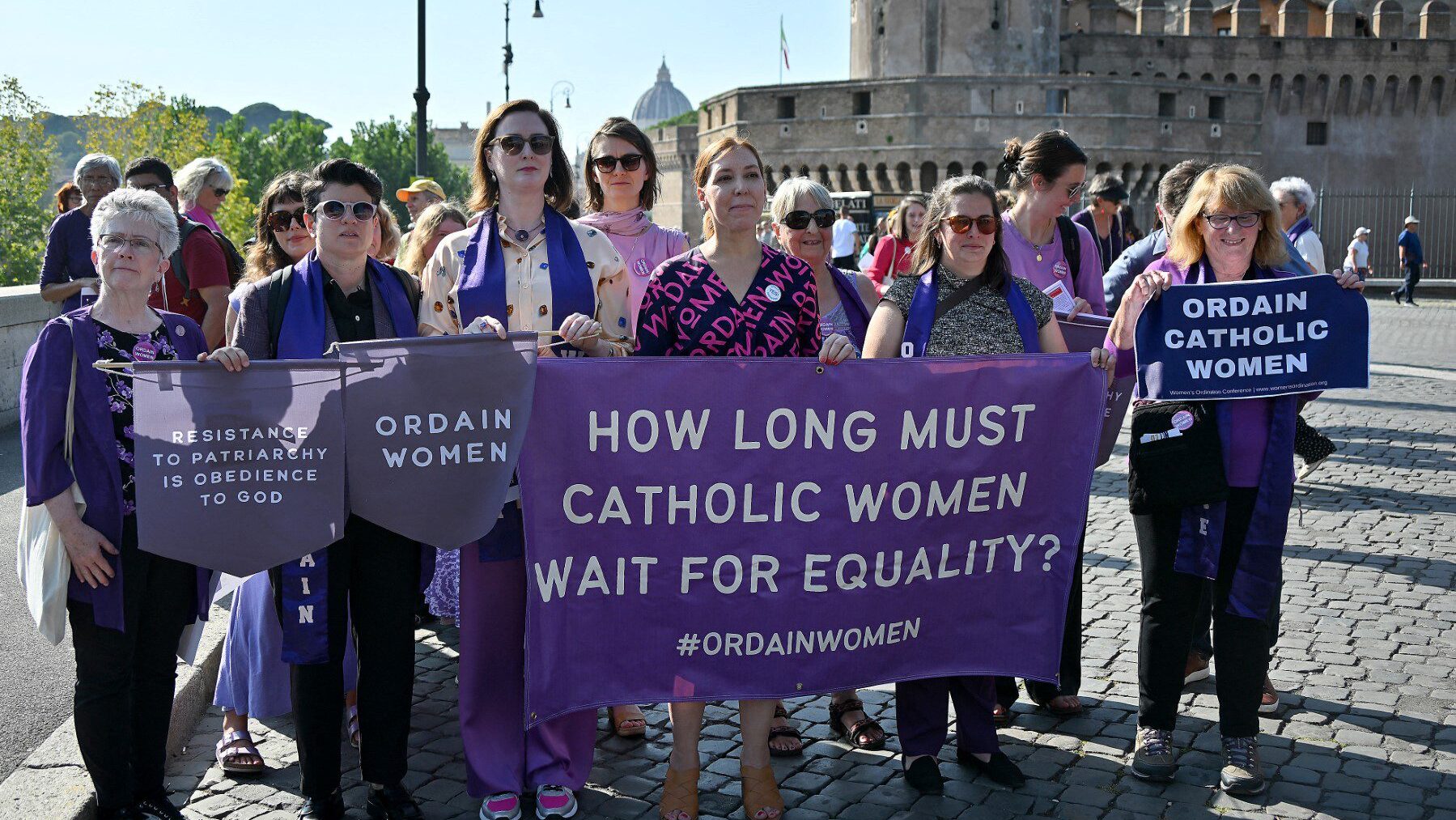
Supporters of Women’s Ordination Conference (WOC), demonstrate to advocate and pray for the ordination of women as deacons, priests, and bishops in the Roman Catholic Church, near the Vatican in Rome, on October 6, 2023.
Photo: Filippo MONTEFORTE / AFP
In a new interview granted to the American television channel CBS, Pope Francis returned to points raised in the doctrinal declaration Fiducia Supplicans, published in December 2023 on the blessing of homosexual couples, and which had given rise to numerous questions inside and outside the Catholic Church. In the interview, he came out clearly and unambiguously against any form of ordination for women, whether as deacons or as priests.
The interview, conducted by Norah O’Donnell, director of the CBS Evening News, tackled a whole series of controversial issues in tune with the zeitgeist. It was recorded at Saint Martha’s House, the pope’s residence in Rome, on April 24th and partially broadcast on Sunday, May 19th.
Pope Francis began by reaffirming his desire to see the Catholic Church open to “everyone,” including and especially sinners. “I too am a sinner,” he explained, refusing to accept any “customs” at the entrance to the Church—using the metaphor of migration that is so dear to him: “If the Church puts customs at its door, it ceases to be the Church of Christ.”
The conversation led him to clarify, once again, his intention behind the doctrinal declaration Fiducia Supplicans, a text published by the Vatican at the end of 2023, which had caused confusion by suggesting that the Catholic Church was in fact allowing the ‘informal’ blessing—with a great deal of vagueness surrounding this notion—of homosexual couples. The pope reiterated that it was not a question of blessing the union, but rather the people. “Blessing is for everyone.” Blessing the union, on the other hand, would be contrary to “the law of the Church.”
His comments were more ambiguous on the issue of homosexuality. “It’s not a crime, but a human fact,” he explained to the journalist. Nor did he use the term ‘sin’ to define it. On the other hand, he was highly critical of the practice of surrogacy, which has become a “business.” Adoption should be the real hope for women in need of children, he added.
The pope then returned to the various conflicts in the news. Not expressing any difference in his approach to Gaza and Ukraine, his message was simple and universal: “All of you, stop. Stop the war. You must find a way to negotiate peace. Strive for peace. A negotiated peace is always preferable to an endless war… Stop. Negotiate.” With regard to the conflict between Russia and Ukraine, this is not the first time he has spoken out in favour of a negotiated peace and a rapid end to hostilities.
In the course of the discussion, the question of the ordination of women was raised by O’Donnell in the following terms: “I’m curious to know if a little girl growing up Catholic today will ever have the opportunity to be a deacon and participate as clergy in the life of the Church.”
Pope Francis’ response was blunt: “No.” The statement, a video extract of which is circulating on social media, has the merit of brevity, and cannot be subject to dubious forms of interpretation to make it say what it would not say. The clarity of the pope’s words has been welcomed by some observers in the traditional Catholic world.
I feel like on this question the Holy Spirit was like, “Let me step in and take care of this one.”pic.twitter.com/bjZdDFJACP
— Eric Sammons (@EricRSammons) May 21, 2024
As well as taking a clear stance on a sensitive issue, the pope, in an interview with an American media outlet, spoke of the tug-of-war between himself and a section of the conservative American episcopate.
A conservative is someone who clings to something and doesn’t want to see beyond it. It’s a suicidal attitude, because it’s one thing to take tradition into account, to consider the situations of the past, it’s quite another to lock yourself into a dogmatic box.”
Tensions are still very much present.
